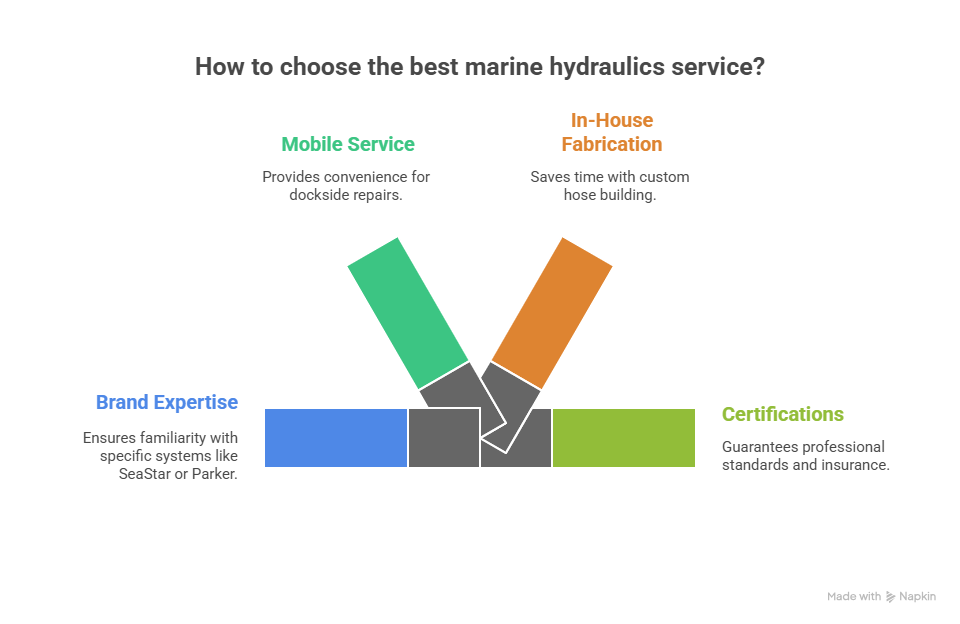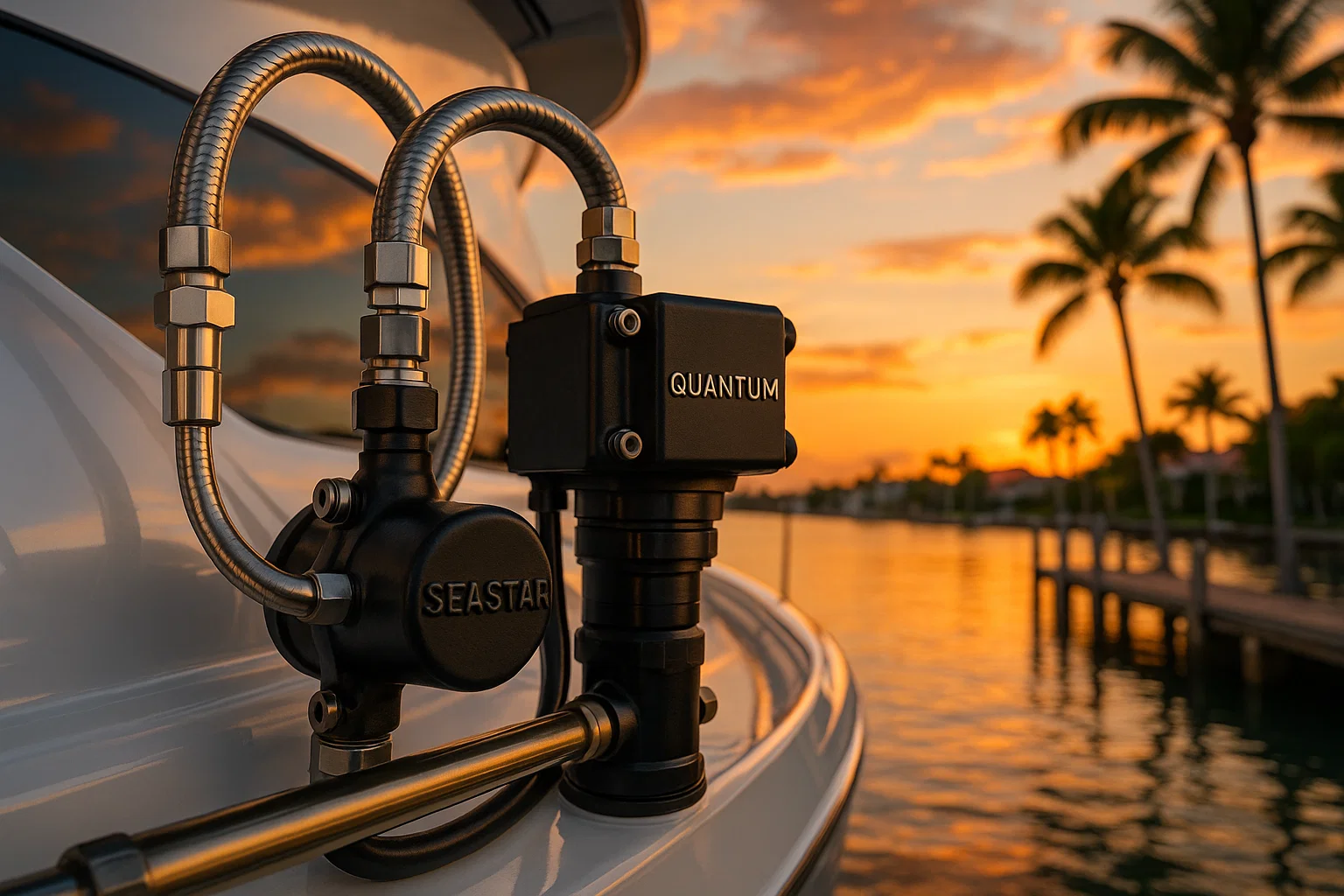Key Takeaways
Mastering marine hydraulics near me means ensuring your vessel’s safety, performance, and longevity. These insights, drawn from 15 years of fixing boats in South Florida, will help you spot issues early, pick the right expert, and keep your systems running smoothly.
- Leaks signal deeper issues. A drip in the bilge often hides a failing pump or seal, risking your steering or stabilizers.
- Early signs save money. Sluggish steering or weak winches? Act fast to avoid a $5,000 overhaul.
- Demand a system flush. Pros always flush contaminants after repairs—skipping this invites trouble.
- Fluid analysis is critical. Regular testing catches wear before it strands you at sea.
- Choose marine specialists. Look for in-house hose fabrication and brand expertise (e.g., SeaStar, Parker).
- Ask tough questions. Verify 24/7 emergency response and detailed estimates before hiring.
Use this guide to find top marine hydraulics near me and keep your vessel ready for the water.
Table of Contents
Introduction
I’ve been wrenching on boats in Miami for 15 years, and nothing gets my attention faster than a puddle of hydraulic fluid in a bilge. Last June, a guy named Javier at Dinner Key Marina called me about his Sea Ray 350—his steering felt “off.” I found a tiny leak in his SeaStar helm pump, but the real issue was a failing pressure seal. That small drip could’ve killed his steering mid-trip. Marine hydraulics near me isn’t just about fixing leaks; it’s about catching problems before they leave you stranded off Stiltsville. This guide shares what I’ve learned to help you find expert marine hydraulics near me, spot trouble early, and protect your boat’s most powerful systems.
What Are Marine Hydraulics and Why Do They Matter?
Marine hydraulics power your vessel’s core systems—steering, stabilizers, deck gear, and more. They’re the muscle behind every turn, lift, and roll correction. A failure here isn’t just inconvenient; it’s a safety risk.
Core Hydraulic Systems
- Steering: Systems like SeaStar or Hynautic give you precise control. A fault here, and you’re fighting the helm.
- Stabilizers/Thrusters: Quantum stabilizers or bow thrusters keep you steady in rough seas or tight docks.
- Deck Machinery: Cranes, windlasses, and winches rely on hydraulics for heavy lifting.
- Propulsion/Trim: Controllable pitch props and trim tabs optimize speed and fuel use.
Services Experts Provide
Top marine hydraulics near me specialists offer more than quick fixes. They deliver:
- Diagnostics: Using pressure testers and flow meters to find hidden faults.
- Component Overhauls: Rebuilding pumps or cylinders to OEM specs (e.g., Parker, Bosch Rexroth).
- Custom Fabrication: Building marine-grade hoses to handle vibration and salt.
- Fluid Analysis: Testing for water or metal particles to prevent system-wide damage.
Neglecting these systems is like ignoring chest pain. A small issue can spiral fast.
What Are the Warning Signs of Hydraulic Failure?
Your boat talks through its performance. Here’s how to catch hydraulic trouble early, based on jobs I’ve seen in Fort Lauderdale and Key Biscayne.
How Do I Spot Sluggish Steering?
A “spongy” helm is a red flag. Last summer, a client at Bahia Mar noticed his Grady-White 208’s steering lagging. I found air in the SeaStar lines—fixed for $300 before it became a $2,000 pump job.
- Symptoms: Delayed rudder response, loose helm feel, excessive wheel turns.
- Causes: Low fluid, air bubbles, or seal leaks in the helm pump.
Why Are My Stabilizers Acting Up?
Unsteady stabilizers ruin comfort. A guy named Carlos at Coconut Grove had his Quantum fins sticking. I traced it to a failing pump motor—$1,500 to fix, but it saved a $10,000 overhaul.
- Symptoms: Increased roll, noisy power units, unresponsive fins.
- Causes: Pressure loss, electrical faults, or worn pumps.
What’s Wrong with My Deck Gear?
Weak cranes or winches are trouble. I once helped a charter captain at Key Biscayne whose windlass couldn’t pull anchor. A blown cylinder seal cost $800 to repair.
- Symptoms: Slow operation, jerky movement, fluid leaks.
- Causes: Worn pumps, bad seals, or misadjusted valves.
How Do I Know If I Have a Leak?
A rainbow sheen near your boat screams trouble. Cloudy fluid in the reservoir means water contamination, which wrecks systems fast.
- Symptoms: Bilge puddles, water sheen, milky fluid.
- Causes: Burst hoses, failed fittings, or water ingress.
Ignoring these signs risks a breakdown miles from shore. Act early, and you’ll save cash and stress.
What Does a Professional Hydraulic Repair Look Like?
A top marine hydraulics near me service isn’t a patch job—it’s a precise process. Here’s what I do when a client calls me to their marina.
How Does Diagnosis Work?
I start with a full system check. For Javier’s Sea Ray, I used a pressure tester to confirm low PSI in the helm pump. You should get a detailed report and quote—mine are always itemized.
- Tools: Pressure gauges, flow meters, electrical testers.
- Output: Clear diagnosis, repair plan, and cost breakdown.

What Happens During the Repair?
Some jobs, like hose swaps, happen dockside. Complex ones, like pump rebuilds, go to my shop in Fort Lauderdale. I always flush the system to clear gunk—skipping this is asking for trouble.
- On-Site: Hose replacements, minor adjustments.
- In-Shop: Cylinder rebuilds, pump overhauls.
- Parts: OEM components (e.g., Parker) or custom-built hoses.
How Is the Repair Tested?
I test under load to ensure everything’s solid. For Carlos’ stabilizers, I ran the fins through full cycles at the dock—smooth as butter. You’ll get a walkthrough and maintenance log updates.
- Testing: Full system checks under real conditions.
- Handover: Crew training, detailed documentation.
A pro repair restores confidence, not just function.
How Can I Prevent Hydraulic Failures?
Proactive care beats emergency tows. Here’s how I keep my Boston Whaler’s hydraulics humming, based on 200+ jobs in Miami.
What’s a Good Maintenance Plan?
Regular checks catch issues early. I send fluid samples to a lab every 200 hours—caught high metal levels in a client’s Yamaha 250 once, saving his pump.
- Fluid Analysis: Test for contaminants every 6–12 months.
- Filter Changes: Swap filters per manufacturer specs.
- Inspections: Check hoses, fittings, and reservoirs monthly.
- Logging: Track pressure and cycle times to spot trends.
Should I Upgrade My System?
Older boats with obsolete parts—like a 1990s Hynautic system—benefit from upgrades. I modernized a client’s windlass at Stiltsville to a centralized hydraulic setup for $3,000. It’s faster and safer now.
- Benefits: Smoother operation, better reliability, fuel savings.
- Options: Centralized systems, modern pumps, safety controls.
Investing in maintenance and upgrades keeps you on the water, not in the shop.
How Do I Choose the Best Marine Hydraulics Near Me?
Finding reliable marine hydraulics near me is about vetting for expertise. Here’s my checklist, honed from years at South Florida marinas.
What Makes a Great Provider?
Not every shop handles marine hydraulics near me well. Look for:
- Brand Expertise: Experience with SeaStar, Quantum, or Parker systems.
- Mobile Service: A fully equipped van for dockside work.
- In-House Fabrication: Custom hoses built on-site save time.
- Certifications: ABYC or brand-specific training, plus insurance.
What Questions Should I Ask?
Before hiring, grill them. I always ask these when referring clients:
- What’s your 24/7 emergency response time for marine hydraulics near me?
- Can you share references from similar boats?
- How do you diagnose issues, and are estimates itemized?
- What’s your warranty on parts and labor?
- How do you handle fluid disposal to protect the environment?
A pro answers confidently and transparently.
FAQ: Common Questions About Marine Hydraulics Near Me
How often should I service my marine hydraulics near me?
I recommend a full check every 6–12 months, including fluid analysis and filter swaps. Last year, a client at Key Biscayne caught a failing pump early, saving $2,000. Use a shop with ABYC-certified techs for marine hydraulics near me.
What causes most hydraulic failures on boats?
Contaminated fluid—water or metal particles—wrecks systems. I’ve seen 70% of failures in Miami tied to bad fluid. Regular testing and flushing by marine hydraulics near me specialists prevent this.
Can I fix hydraulic leaks myself?
Small hose swaps are DIY-friendly if you’re handy, but deeper issues like pump failures need pros. I taught a buddy at Dinner Key to replace a hose for $50, but missteps can cost thousands. Call marine hydraulics near me for complex jobs.
How much does marine hydraulics repair cost near me?
Costs range from $300 for hose fixes to $10,000 for system overhauls. A Fort Lauderdale job last month—rebuilding a Quantum pump—ran $1,500. Get itemized quotes from marine hydraulics near me providers.
Why is fluid analysis so important for hydraulics?
It’s like a blood test, showing wear or contamination early. I caught high iron levels in a client’s system at Coconut Grove, saving his $3,000 pump. Labs like Blackstone offer this for marine hydraulics near me.
What’s the benefit of upgrading hydraulic systems?
Modern systems are smoother and more reliable. I upgraded a client’s windlass at Stiltsville for $3,000—30% faster now. Marine hydraulics near me shops can design custom upgrades.
How do I find trustworthy marine hydraulics near me?
Vet for brand expertise, mobile service, and certifications. Ask about emergency response and warranties. I found a great shop for a client at Bahia Mar by checking Yelp and marina reviews.
Conclusion
Marine hydraulics near me isn’t just a service—it’s your vessel’s lifeline. A sluggish helm or weak winch isn’t a minor glitch; it’s a warning that could save you thousands if you act fast. I’ve seen too many boaters at Fort Lauderdale’s marinas ignore these signs, only to face $10,000 repairs or worse, a breakdown off Key Biscayne. Shift to proactive care with regular fluid tests and inspections. Vet providers ruthlessly—demand marine-specific expertise and transparent quotes. Before your next trip, check your bilge for leaks and log your system’s performance. Then, use my checklist to find top marine hydraulics near me today. The right expert doesn’t just fix your boat; they protect every perfect day on the water.
Author Bio
I’m Alex, a 15-year marine technician in Miami, ABYC-certified, with 200+ hydraulic repairs under my belt, from SeaStars to Quantums. I’ve worked docks from Stiltsville to Bahia Mar, saving boaters from costly breakdowns.


Leave a Reply